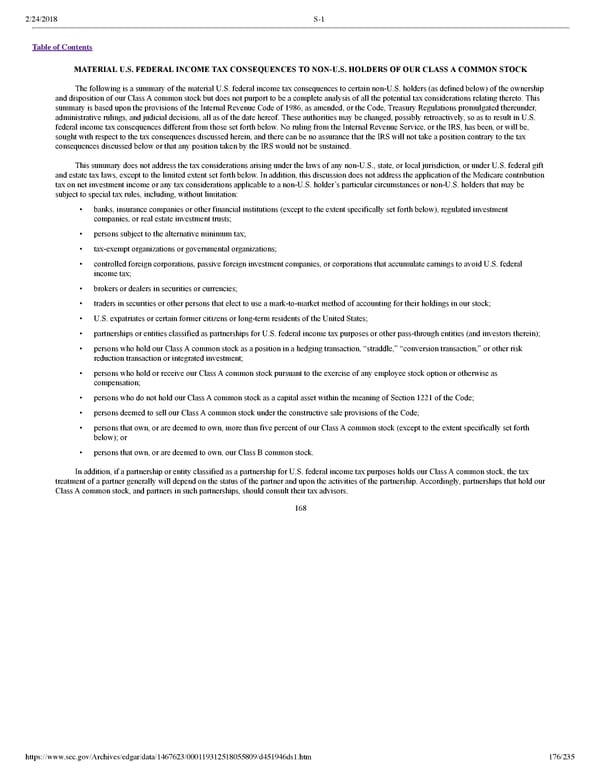2/24/2018 S-1 Table of Contents MATERIAL U.S. FEDERAL INCOME TAX CONSEQUENCES TO NONU.S. HOLDERS OF OUR CLASS A COMMON STOCK The following is a summary of the material U.S. federal income tax consequences to certain nonU.S. holders (as defined below) of the ownership and disposition of our Class A common stock but does not purport to be a complete analysis of all the potential tax considerations relating thereto. This summary is based upon the provisions of the Internal Revenue Code of 1986, as amended, or the Code, Treasury Regulations promulgated thereunder, administrative rulings, and judicial decisions, all as of the date hereof. These authorities may be changed, possibly retroactively, so as to result in U.S. federal income tax consequences different from those set forth below. No ruling from the Internal Revenue Service, or the IRS, has been, or will be, sought with respect to the tax consequences discussed herein, and there can be no assurance that the IRS will not take a position contrary to the tax consequences discussed below or that any position taken by the IRS would not be sustained. This summary does not address the tax considerations arising under the laws of any nonU.S., state, or local jurisdiction, or under U.S. federal gift and estate tax laws, except to the limited extent set forth below. In addition, this discussion does not address the application of the Medicare contribution tax on net investment income or any tax considerations applicable to a nonU.S. holder’s particular circumstances or nonU.S. holders that may be subject to special tax rules, including, without limitation: • banks, insurance companies or other financial institutions (except to the extent specifically set forth below), regulated investment companies, or real estate investment trusts; • persons subject to the alternative minimum tax; • taxexempt organizations or governmental organizations; • controlled foreign corporations, passive foreign investment companies, or corporations that accumulate earnings to avoid U.S. federal income tax; • brokers or dealers in securities or currencies; • traders in securities or other persons that elect to use a marktomarket method of accounting for their holdings in our stock; • U.S. expatriates or certain former citizens or longterm residents of the United States; • partnerships or entities classified as partnerships for U.S. federal income tax purposes or other passthrough entities (and investors therein); • persons who hold our Class A common stock as a position in a hedging transaction, “straddle,” “conversion transaction,” or other risk reduction transaction or integrated investment; • persons who hold or receive our Class A common stock pursuant to the exercise of any employee stock option or otherwise as compensation; • persons who do not hold our Class A common stock as a capital asset within the meaning of Section 1221 of the Code; • persons deemed to sell our Class A common stock under the constructive sale provisions of the Code; • persons that own, or are deemed to own, more than five percent of our Class A common stock (except to the extent specifically set forth below); or • persons that own, or are deemed to own, our Class B common stock. In addition, if a partnership or entity classified as a partnership for U.S. federal income tax purposes holds our Class A common stock, the tax treatment of a partner generally will depend on the status of the partner and upon the activities of the partnership. Accordingly, partnerships that hold our Class A common stock, and partners in such partnerships, should consult their tax advisors. 168 https://www.sec.gov/Archives/edgar/data/1467623/000119312518055809/d451946ds1.htm 176/235
 Dropbox S-1 | Interactive Prospectus Page 175 Page 177
Dropbox S-1 | Interactive Prospectus Page 175 Page 177